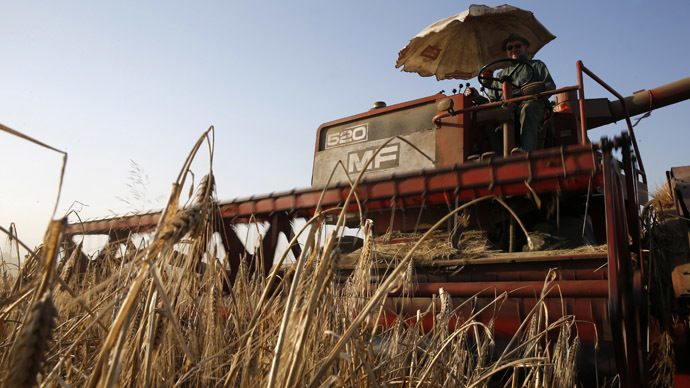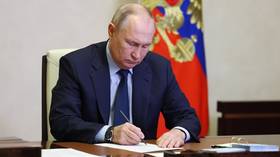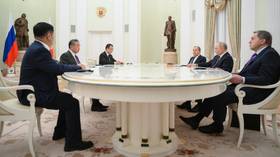‘Europe getting fed up with the US business influence’

Europeans’ anger with their governments over US-led sanctions against Russia can go “quite far” as they are fed up with US business influence helping arms exporters and NATO, but not average Europeans, former British diplomat William Mallinson told RT.
RT:On Friday, French farmers in the city of Brest in Brittany set local tax office on fire, in protest against tit-for-tat sanctions with Russia. Is the Russian food ban hitting European businesses that bad, making people that desperate?
William Mallinson: Yes. What we have to remember is that the EU is originally founded on the livelihood for farmers and for supplying food to Europeans. Despite the fact that there is a very large number of huge farms, in France, in particular, [there are] still a lot of small farmers. The French agriculturalists are one of the most powerful political forces in France. I remember the Poujadists in 1960-70s [a movement named after Pierre Poujade that articulated the economic interests and grievances of shopkeepers and other proprietor-managers of small businesses facing economic and social change - RT]; they are quite capable of causing major problems for the government.
France is a rather strong country compared to Greece, for example, where there is a similar problem with agriculture, and it makes one think of something far more powerful in the European context, which could influence Spanish farmers as well. Greece unfortunately has gone the way of America much more than France has, after the Americans got rid of Karamanlis, because he was trying to come closer to Russia. The Greek situation is difficult but the French thing is a good example of what could happen in other Southern European countries.
You should also connect this to the impending deliveries of the two helicopter carriers to Moscow. This is all connected. Jobs are at stake, economy is at stake. You are going to see a lot of tension now between the French President, who tends to be rather pro-American in foreign policy and pro-NATO, and forces which are becoming stronger in France, probably surrounding Marine Le Pen, who is not an extremist, she is quite intellectual, even people like Dominique de Villepan who was famous in the UN in 2003 not wishing to go into Iraq. We will see more people like that going into the ascendant as the sanctions bite the original backbone of the whole European idea. Remember that idea wasn’t just never to have a war again, it wasn’t just coal and steel, it was very much agriculture and it was run mainly by the French. The French still influence it in their own interest. So we need to look at this quite seriously, it’s a serious move and it may actually be positive for Russia in the long-run.
RT:So we're now seeing people getting more and more angry with their governments, over Russian food embargo. How far is this going, in your opinion?
WM: I think it is going to go on and on as long as the sanctions continue - sanctions which are very much for people’s egos and are very much orchestrated by the Americans. Europe is slowly getting fed up with the US business influence which helps the American arms shareholders and NATO far more than the average European citizen. Given that most European countries luckily still have some vague sense of democracy, they have to listen to the people, and so it can go quite far.
RT:Brussels promised European farmers compensation, now that they lost one of their key markets. Will it be able to cover all the losses and deliver the promised money to the farmers?
WM: I doubt that it will be easy to deliver because the European budget isn’t quite big enough. Although the largest part is still probably agriculture, the euro itself is under some threat. If it does deliver it will cause problems in other sectors of the economy, generally in the European economies and will not help Europe out of the recession, which it is still in. It is really a lose-lose situation with the sanctions, frankly.
RT:Which side is suffering most from this sanctions war?
WM: It’s not good for anybody. We have a saying in Greece “we are all boiling in the same pot”. Quite frankly, it is bad for everybody and to measure this in percentages, I would say that in the long-term if America continues to twist European arms successfully, it will probably benefit Russia more because it will help the BRICS economies to get stronger, to have their own currency systems, etc. And that would be an unfortunate move perhaps, but it is maybe what will happen. Russia is a far older, stronger, huger, slower but more thoughtful country than the US, and therefore, logically speaking, historically speaking, it is undoubtedly Russia which will have the upper hand. Not that it is looking for it, but it is what would happen if the NATO neurosis continues.
The statements, views and opinions expressed in this column are solely those of the author and do not necessarily represent those of RT.
The statements, views and opinions expressed in this column are solely those of the author and do not necessarily represent those of RT.













